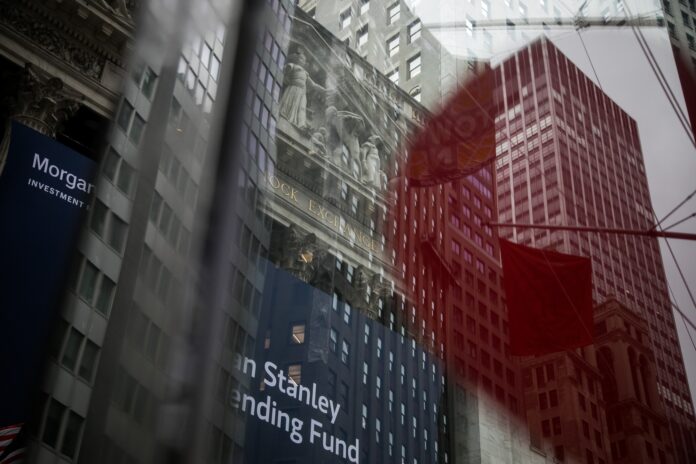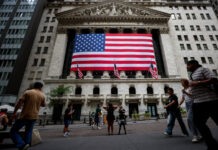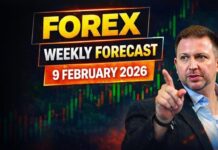
Stocks wavered at the start of a week that will bring inflation data seen as key in shaping the outlook for Federal Reserve policy and the direction of markets.
This month’s advance in the S&P 500 put the gauge close to erasing its April slide as speculation grew that inflationary pressures have eased. While the projected annual increase for the core consumer price index due Wednesday would be the smallest in three years, the measure would still be running too fast to placate policymakers, who want evidence inflation is slowing consistently to allow rate cuts.
JPMorgan Chase & Co.’s trading desk says investors are gearing up for big swings in the S&P 500 following the CPI report, according to a note from Andrew Tyler. Daily breakevens in the options market show traders are betting that the equity benchmark will move 1% in either direction after the data.
“The key risk is a hotter CPI print, but upcoming macro data creates a two-tailed risk — with one tied to stronger-than-expected growth fueling inflation concerns and the other being weaker growth fueling either recession or ‘stagflation’ concerns,” Tyler said.
The S&P 500 hovered near 5,230. Treasury 10-year yields declined three basis points to 4.46%. The dollar fell.
Ahead of that, economists will parse the government’s report on producer prices Tuesday to assess the impact of categories such as health care and portfolio management that feed into the Fed’s preferred inflation gauge — the personal consumption expenditures price index. Fed Chair Jerome Powell is also scheduled to speak on the same day at a foreign bankers event in Amsterdam.
US equities are poised for a correction as soon as this quarter as inflation remains sticky and expectations for the Fed to cut interest rates get further pushed out, according to Stifel Nicolaus & Co.’s Barry Bannister. He forecast the S&P 500 will drop roughly 10% in second or third quarter to 4,750.
Investors ready to trim or ditch their stock exposure because they are worried the S&P 500 is losing steam after a double-digit run up since October should look to history for reasons to stay committed to their US equity allocations.
Since the 1930s, missing out on the 10 best days per decade for the benchmark would have yielded a 66% gain — a fraction of the roughly 23,000% return staying invested through those days would have generated, according to data from Bank of America Corp. More importantly, those best days have come after the worst days for stocks, when selling was likely most tempting, the bank’s analysis showed.
“Market timing is fraught with peril, and panic selling results in outsized opportunity costs,” Savita Subramanian, head of US equity and quantitative strategy at BofA, said in a note to clients on Friday. “’Time in the market beats timing the market’ is an old but prescient adage.”
Corporate Highlights:
- GameStop Corp. surged after a cryptic post on X from Keith Gill, more popularly known by his social media alias “Roaring Kitty.” He gained notoriety in 2021 after posting a series of videos online urging investors to jump on the GameStop bandwagon during the meme-stock frenzy.
- Apple Inc. has closed in on an agreement with OpenAI to use the startup’s technology on the iPhone, part of a broader push to bring artificial intelligence features to its devices, according to people familiar with the matter.
- Intel Corp. is in advanced talks with Apollo Global Management over a deal that would have the investment firm providing more than $11 billion in funding for a chip manufacturing plant in Ireland, the Wall Street Journal said.
- Nvidia Corp. rose after Jefferies lifted its 12-month target to $1,200 from $780, saying it sees the chipmaker “taking more of the pie” with a “reload on AI”
- Takeda Pharmaceutical Co. agreed to develop AC Immune SA’s immunotherapies targeting toxic, abnormal proteins in Alzheimer’s patients’ brains in a licensing deal worth as much as $2.2 billion.
- BHP Group Ltd. said Anglo American Plc rebuffed an improved takeover offer, which valued the mining company at about £34 billion ($43 billion).
Key events this week:
- Germany CPI, ZEW survey expectations, Tuesday
- Bank of England Economist Huw Pill speaks, Tuesday
- US PPI, Tuesday
- Fed Chair Jerome Powell and ECB Governing Council member Klaas Knot speak, Tuesday
- China rate decision, Wednesday
- Eurozone industrial production, GDP, Wednesday
- US CPI, retail sales, business inventories, empire manufacturing, Wednesday
- Minneapolis Fed President Neel Kashkari speaks, Wednesday
- Japan GDP, industrial production, Thursday
- US housing starts, initial jobless claims, industrial production, Thursday
- Philadelphia Fed President Patrick Harker speaks, Thursday
- Cleveland Fed President Loretta Mester speaks, Thursday
- Atlanta Fed President Raphael Bostic speaks, Thursday
- China property prices, retail sales, industrial production, Friday
- Eurozone CPI, Friday
- US Conf. Board leading index, Friday
Some of the main moves in markets:
Stocks
- The S&P 500 was little changed as of 9:40 a.m. New York time
- The Nasdaq 100 was little changed
- The Dow Jones Industrial Average rose 0.2%
- The Stoxx Europe 600 fell 0.2%
- The MSCI World index rose 0.2%
Currencies
- The Bloomberg Dollar Spot Index fell 0.1%
- The euro rose 0.3% to $1.0802
- The British pound rose 0.3% to $1.2559
- The Japanese yen was little changed at 155.74 per dollar
Cryptocurrencies
- Bitcoin rose 2.2% to $62,612.19
- Ether rose 1.4% to $2,963.23
Bonds
- The yield on 10-year Treasuries declined three basis points to 4.46%
- Germany’s 10-year yield declined two basis points to 2.49%
- Britain’s 10-year yield declined two basis points to 4.15%
Commodities
- West Texas Intermediate crude rose 1% to $79.05 a barrel
- Spot gold fell 0.7% to $2,343.97 an ounce













